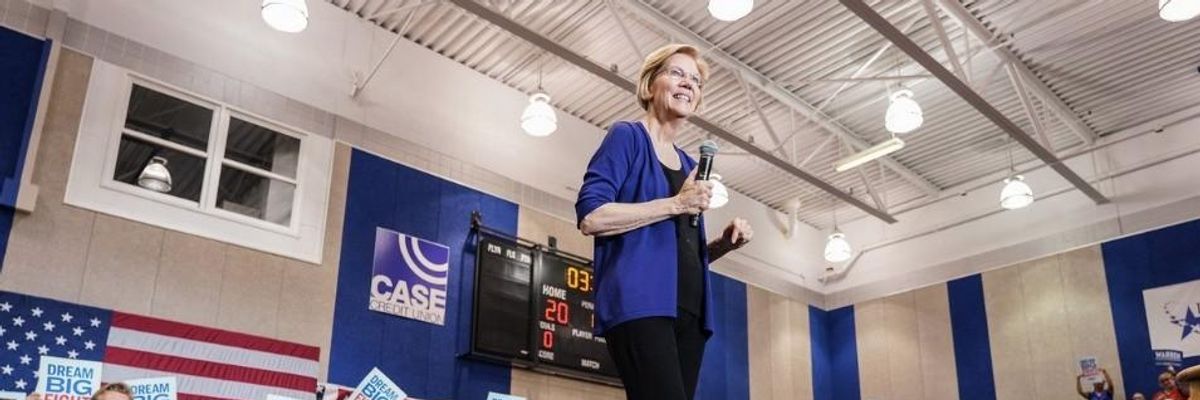As she traveled to Iowa on the campaign trail on Wednesday, Sen. Elizabeth Warren outlined how a number of the proposals she's released during her 2020 presidential campaign would support rural communities across the country--as well as announcing a brand-new $200 billion plan to greatly expand healthcare and broadband access in places she says have gone without it for too long.
Warren's plans for universal childcare, supporting family-owned farms, and student loan debt relief would all have positive effects on rural towns, the Massachusetts Democrat said in a Medium post and in a video posted to social media.
"No matter where you live in America you should have the opportunity to thrive," Warren said. "But today that seems further and further out of reach for rural families. My plan will expand opportunities to rural families and my other major proposals do, too."
Warren also expanded on her previously-stated support for Medicare for All to outline how some aspects of her plan for healthcare in the U.S. would be tailored to communities that are far from the country's biggest hospitals, in rural areas which have seen 112 hospitals close in less than 10 years.
"Barriers to coverage, disappearing health facilities, and a shortage of health professionals are denying rural communities the high-quality healthcare they deserve," the senator wrote.
Warren pledged to raise reimbursement rates for rural hospitals, allowing more of them to continue operating and making them less vulnerable to large healthcare companies that aim to fold them into a larger operation, often degrading the level of care communities get.
A Warren administration, she said, would direct the Federal Trade Commission (FTC) to block any healthcare company merger unless the companies could prove that consolidation would improve healthcare access to communities.
When a merger is "a first step to closing hospitals or slashing basic services, then a Warren administration will block it," the senator wrote.
The plan would also increase funding for community health centers by 15 percent over 15 years and establish a $25 billion capital fund to help rural towns pay for badly-needed facilities, such as birthing centers, school health centers, diabetes care programs, and telemedicine.
The establishment of telemedicine programs, Warren said, would be helped by another facet of her plan for rural America: her "public option for broadband," a proposal which she compared to the establishment in the 1930s of electricity as a public utility--not a service that companies could pick and choose who they overed it to, passing over rural communities.
At Medium, Warren explained how laws in 26 states have kept municipalities from establishing their own high-speed broadband networks, leaving more than 26 percent of people in rural areas and 32 percent of people in tribal lands without reliable access (pdf) to the internet.
Internet service providers like Verizon and Comcast, Warren wrote, have "deliberately restricted competition, kept prices high, and used their armies of lobbyists to convince state legislatures to ban municipalities from building their own public networks. Meanwhile, the federal government has shoveled billions of taxpayer dollars to private ISPs in an effort to expand broadband to remote areas, but those providers have done the bare minimum with these resources--offering internet speeds well below the FCC minimum."
"This ends when I'm President," wrote Warren.
Warren would combat those state laws with a federal statute affirming that municipalities can establish their own high-speed broadband networks, as well as establishing a federal Office for Broadband Access and investing $85 billion in expanding access across the country.
Advocates for expanding broadband access to rural communities applauded the plan, with one journalist calling it "a great equalizer."

